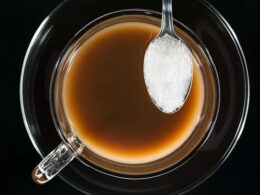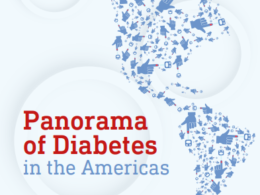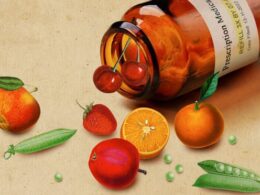Health Transformation Institute (HTI)
institute for continuous transformation,
health strategy and digital health
Joaquim Cardoso MSc
Chief Research and Strategy Officer (CRSO)
May 15, 2023
ONE PAGE SUMMARY
The World Health Organization (WHO) advises against using non-sugar sweeteners (NSS) for weight control or reducing the risk of noncommunicable diseases (NCDs).
- A systematic review found no long-term benefits of NSS in reducing body fat in adults or children, and potential risks including an increased risk of type 2 diabetes, cardiovascular diseases, and mortality in adults.
- WHO recommends reducing overall sweetness in the diet by consuming naturally occurring sugars from fruits or unsweetened food and beverages instead of NSS.
The guideline applies to all individuals except those with pre-existing diabetes and covers all synthetic and naturally occurring non-nutritive sweeteners used in manufactured foods and beverages or added by consumers.
- Personal care products, low-calorie sugars, and sugar alcohols are not considered NSS and are not included in the recommendation.
The conditional nature of the recommendation acknowledges the potential confounding factors and the need for country-specific discussions regarding policy decisions.
The guideline is part of WHO’s efforts to promote healthy diets, improve dietary quality, and reduce the global burden of NCDs.
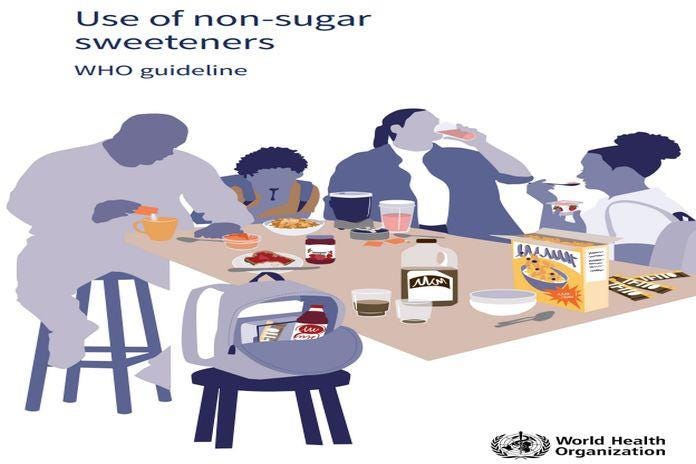
WHO advises not to use non-sugar sweeteners for weight control in newly released guideline
WHO
15 May 2023
The World Health Organization (WHO) has released a new guideline on non-sugar sweeteners (NSS), which recommends against the use of NSS to control body weight or reduce the risk of noncommunicable diseases (NCDs).
The recommendation is based on the findings of a systematic review of the available evidence which suggests that use of NSS does not confer any long-term benefit in reducing body fat in adults or children. Results of the review also suggest that there may be potential undesirable effects from long-term use of NSS, such as an increased risk of type 2 diabetes, cardiovascular diseases, and mortality in adults.
“Replacing free sugars with NSS does not help with weight control in the long term. People need to consider other ways to reduce free sugars intake, such as consuming food with naturally occurring sugars, like fruit, or unsweetened food and beverages,” says Francesco Branca, WHO Director for Nutrition and Food Safety. “NSS are not essential dietary factors and have no nutritional value. People should reduce the sweetness of the diet altogether, starting early in life, to improve their health.”
The recommendation applies to all people except individuals with pre-existing diabetes and includes all synthetic and naturally occurring or modified non-nutritive sweeteners that are not classified as sugars found in manufactured foods and beverages, or sold on their own to be added to foods and beverages by consumers. Common NSS include acesulfame K, aspartame, advantame, cyclamates, neotame, saccharin, sucralose, stevia and stevia derivatives.
The recommendation does not apply to personal care and hygiene products containing NSS, such as toothpaste, skin cream, and medications, or to low-calorie sugars and sugar alcohols (polyols), which are sugars or sugar derivatives containing calories and are therefore not considered NSS.
Because the link observed in the evidence between NSS and disease outcomes might be confounded by baseline characteristics of study participants and complicated patterns of NSS use, the recommendation has been assessed as conditional, following WHO processes for developing guidelines. This signals that policy decisions based on this recommendation may require substantive discussion in specific country contexts, linked for example to the extent of consumption in different age groups.
The WHO guideline on NSS is part of a suite of existing and forthcoming guidelines on healthy diets that aim to establish lifelong healthy eating habits, improve dietary quality and decrease the risk of NCDs worldwide.
Originally published at https://www.who.int on May 15, 2023.
ORIGINAL PUBLICATION
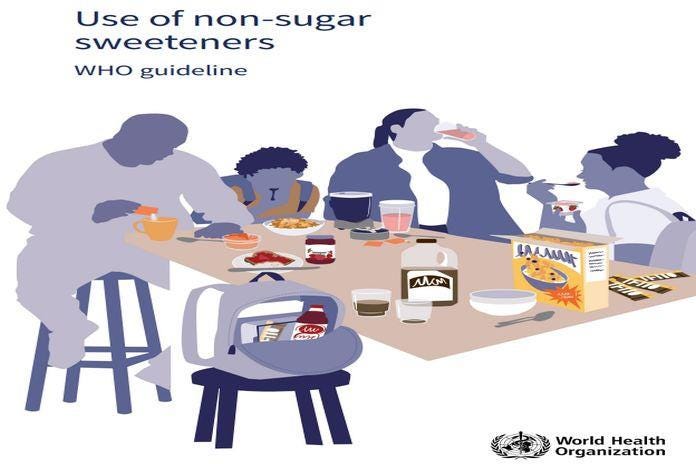
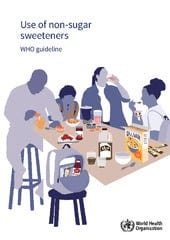
Overview
This guideline provides evidence-informed guidance on the use of non-sugar sweeteners to reduce the risk of unhealthy weight gain and diet-related noncommunicable diseases in adults and children.
The guidance in this guideline is not based on toxicological assessments of the safety of individual non-sugar sweeteners and is therefore not intended to update or replace guidance on safe or maximal levels of intake established by the Joint Food and Agriculture Organization of the United Nations (FAO)/WHO Expert Committee on Food Additives (JECFA) or other authoritative bodies.
This guideline is intended for a wide audience involved in the development, design and implementation of policies and programmes in nutrition and public health.
This guideline includes a recommendation on the use of non-sugar sweeteners which can be used by policy-makers and programme managers to address non-sugar sweetener use in their populations through a range of policy actions and public health interventions.
The guidance in this guideline should be considered in the context of that from other WHO guidelines on healthy diets.
WHO TEAM
Guidelines Review Committee, Nutrition and Food Safety
EDITORS
World Health Organization
NUMBER OF PAGES
90
REFERENCE NUMBERS
ISBN: 978–92–4–007361–6






